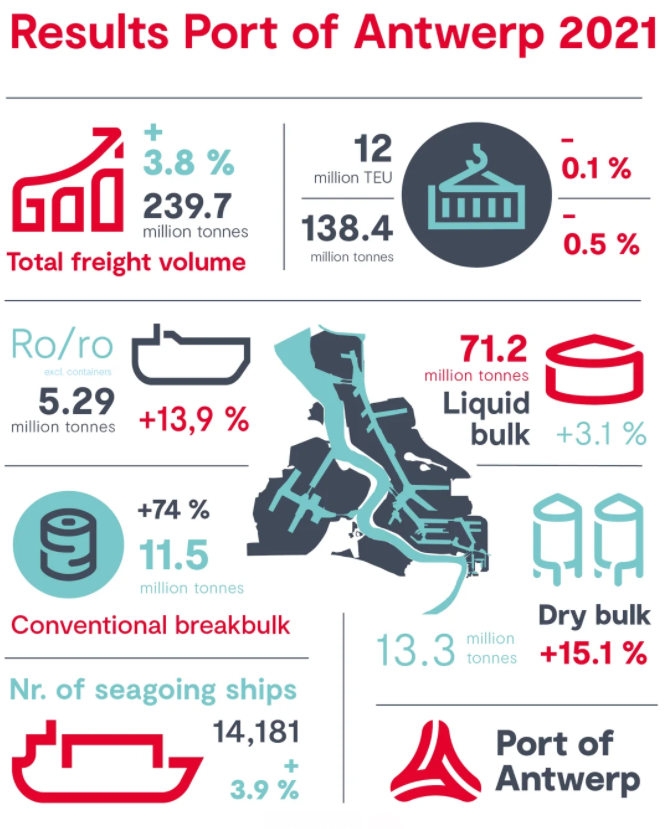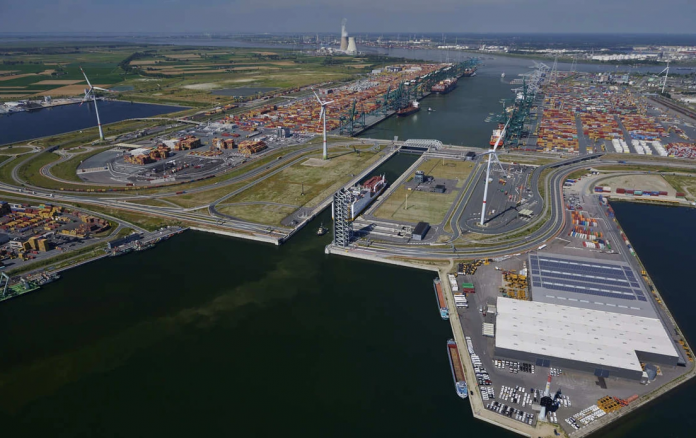In 2021, the Port of Antwerp has registered a performance matching the record year of 2019, despite disruptions in the global supply chain, in terms of total cargo throughput tonnage volumes.
Container traffic remained steady with the Belgian port proceeding 12.02 million TEU in 2021, which translates to a marginal decrease of 0.1% year-on-year.
Among them, the number of reefer containers handled at the port boosted by 2.6% compared to the previous year, partly due to the increased demand and the strong network with Latin America, Africa and the United States.
Annick De Ridder, chairman of the board of directors of Port of Antwerp and Antwerp Alderman responsible for the port, noted that despite the ongoing Covid-19 crisis, the many vacancies, the Suez Canal incident and the associated global disruptions in 2021, the second busiest European port managed to return to the record levels of 2019.
 Meanwhile, the total cargo throughput per tons was 240 million, reflecting a growth of 3.8% compared to 2020 as well as a slight growth over 2019.
Meanwhile, the total cargo throughput per tons was 240 million, reflecting a growth of 3.8% compared to 2020 as well as a slight growth over 2019.
The port, however, explained that global containerised liner shipping is still highly disrupted, causing irregular calls from ocean-going vessels and ports to be missed out in the rotation.
“As a result, average call sizes are getting higher and higher and there are ever-increasing peaks in call sizes, representing a major challenge for the entire logistics chain in and around the port,” said a port representative in a statement.
Moreover, the flow of goods between the European Union (EU) and the United Kingdom (UK) decreased, as a result of the logistical and administrative challenges caused by Brexit.
Despite this, the port of Antwerp recorded growth in total throughput of 6% with the UK and 14.6% with Ireland compared to 2020, which was mainly driven by the extensive shortsea connections.
Regarding 2022, the Belgian port estimates that it will be a positive year, while the merger with the Port of Zeebrugge, which is expected to be completed at the end of April, and other important pioneering projects are underway.
“In the longer term, the nitrogen matter, the achievement of much-needed additional container capacity, and the energy transition will be great challenges,” claimed Jacques Vandermeiren, CEO of Port of Antwerp, who went on to add “That is why the historic agreement of the merger with the port of Zeebrugge is visionary. Together, we are stronger to face the challenges of the future.”
Furthermore, the Port of Antwerp will focus on purposeful transition and sustainable growth, in addition to resilience. Programmes include the delivery of the first methanol-powered tug, the methatug.
It will also be an important year for the NextGen District, the future hotspot for the circular economy in the heart of the port. According to port officials, the first concessionaires, Triple Helix and Bolder Industries, have now officially signed and they will proceed with the practical implementation in the next months.







